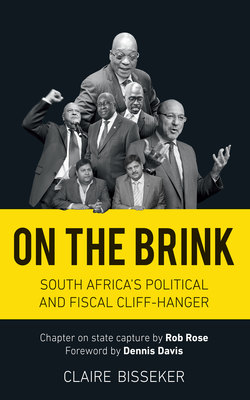Читать книгу On the Brink - Claire Bisseker - Страница 6
На сайте Литреса книга снята с продажи.
Preface and acknowledgements
ОглавлениеI don’t remember much about my interview for a job at the Financial Mail in Cape Town 20-odd years ago, but I do remember the then editor, Nigel Bruce, asking me what the country’s number one economic problem was. Unbeknown to Bruce, there was an illustrated cover of a recent copy of the Financial Mail on the wall behind him. It showed South Africa’s finance minister at the time, Chris Liebenberg, being carted skywards in a hot-air balloon under a headline that suggested that inflation was South Africa’s number one problem.
Still, I answered: ‘Unemployment!’
‘No!’ said Bruce, ‘Inflation!’
I got the job anyway (clinched by my willingness to work for peanuts), but I’m still surprised when the universe tries to nudge me in the right direction, like it did that day. Two years ago, Tafelberg’s Erika Oosthuizen gave me a similar prod when she suggested I write a book exploring whether South Africa was going to go over the fiscal cliff. I demurred, having three kids and a full-time job, but she had planted a seed and when I was subsequently granted a few months of unexpected long-service leave, I took up the challenge.
This book is written in the style of a Financial Mail cover story, which makes it essentially a work of journalism. It contains lots of reportage and direct quotes, but plenty of analysis and opinion too. It’s a style that takes the nub of academic research and blends it with direct interviews with the researchers themselves to make the technical insights come alive on the page. It means that when the author’s opinion is delivered, it comes bolstered by fact, making it that much more persuasive.
Journalist turned author Malcolm Gladwell uses a similar technique in his best-selling books. Like Gladwell, I also cut my teeth as a science writer, which probably explains my attachment to academic research and the pleasure I get from making it accessible to readers.
I would have valued a book like On the Brink when I was an economics student at university. I hope it will help readers make sense of South Africa’s economic decline over the past five years and the country’s failure to get on top of its most pressing problems – unemployment, poverty and inequality. It should leave them with the understanding that these challenges, deep-seated and complex as they are, are not insurmountable with the right economic policies. Therefore, it’s not just a matter of time before South Africa becomes a failed state, though we are skating very close to the edge.
This book would have been impossible to write without the backing of the Financial Mail, which gave me not only time off to write it, but also permission to quote from the publication’s articles. These form the backbone of this narrative. Thanks especially to the editor, Rob Rose, who also generously agreed to write the superb chapter on state capture, despite the many other pressing demands on his time.
Over the past year, I have done more than 15 dedicated interviews for this book. The most substantial were those with Trevor Manuel, Nhlanhla Nene, Lungisa Fuzile, Michael Spicer, Adrian Gore, Nic Borain, Justin Barnes, Rian le Roux and Iraj Abedian. Several other economists have been unstinting in sharing their technical expertise over many years, including Sanlam’s Arthur Kamp, Rand Merchant Bank’s Ettienne le Roux and Deutsche Bank’s Danelee Masia, for which I am exceedingly grateful. Economists tend to get a bad rap for practising their dismal science but I have found them to be consistently the most lucid and perceptive commentators on South Africa’s condition. The last time they were this worried about the state of the economy was during the global financial crisis of 2009.
Trying to predict the end game now, in June 2017, before the ANC’s policy conference, the parliamentary vote of no confidence in Zuma, or the crucial December ANC elective conference is fraught with peril. Zuma has dug in, seemingly impervious to the revelations emerging daily from the Gupta email cache, though the careers of Brian Molefe, Ben Ngubane and Hlaudi Motsoeneng have all bitten the dust in recent days. More dominoes will fall before the end.
Right now it feels as though the country could go either way. It teeters on the brink of making a calamitous mistake. I fear that it will end badly but hope that sense will prevail. Certainly, the economy is in a dangerous downward spiral and only an extraordinary political resolution will be able to change its trajectory.
‘I’m sure our children will say that these 30 years we went through hell,’ said Iraj Abedian in one of my earliest interviews for this book. I was shocked to think that it could take 30 years for South Africa to hit rock bottom and then to repair all the damage of the Zuma years. What happens in the next few months will determine the kind of country we bequeath to our children. It is that simple and that terrifying.
Thanks are also due to Gill Moodie, my enthusiastic publisher, who bolstered my flagging spirits more than once, Mark Ronan for his expert editing skills, and my beloved family, who allowed me to neglect them while I spent weekends at my computer in the race to finish on time.
I still love working for the Financial Mail, having survived six editors. And even though I now work alone from a study at the bottom of my Franschhoek garden, the satisfaction of filing a well-told story remains just as sweet as it was when I started. (The salary is still peanuts.)
